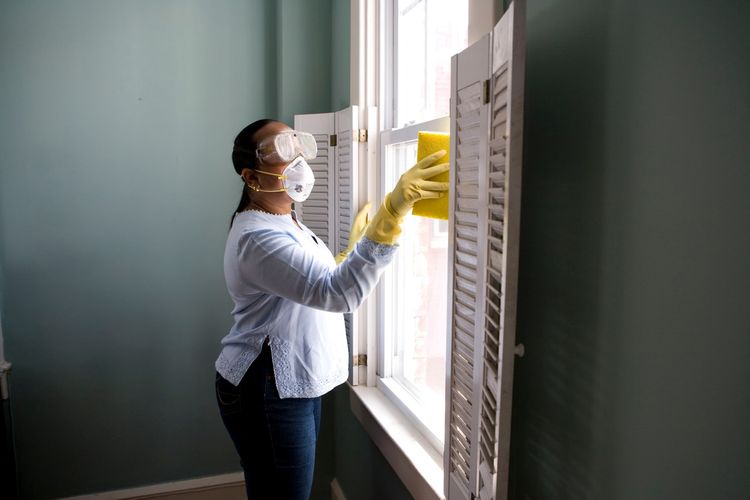Most people get the itch to do some cleaning in the spring. After being huddled up in their homes all winter, it makes sense that warmer weather spurs people into action and gets them motivated to do things around the house.
There are many benefits to partaking in spring cleaning that goes beyond the psychological. Yes, cleaning is a great mood booster that can help you relieve anxiety, but it’s also a healthy habit to have. Why? Mainly because as your home is closed up for the winter, the air will become stagnant and dusty, and spring is the perfect time to clean, open up all the windows, and let the air circulate.

source:feedsportal.com
Homes that are closed up tightly over the winter are at higher risk of accumulating contaminants in the air and also having higher levels of moisture. Things like mold spores, dust, dander, and chemicals, circulate throughout the home and get breathed in by the people living there, causing allergies or other illnesses. This is why it’s advised that you open your windows during the winter occasionally on days without precipitation, allowing the air to circulate properly.
Page Contents
Why Regular Window Maintenance is Important
Speaking of windows, most people don’t even think to add them to their spring cleaning to-do list, which is a shame because regular window maintenance is important. Read this ultimate FAQ on Residential Windows to get a full understanding of how having quality windows is vital to the health of you and your home.

source:pxfuel.com
Air Leaks
Basically, your windows are responsible for regulating the air and amount of light in your home. Windows that don’t get maintained properly can develop cracks that let air, water, or even pests in. This can cost you money in energy bills if you’re trying to heat or cool your home, as your heating and cooling units work overtime to regulate the temperature inside when air is leaking.
Water Leaks
Water leaks are also very problematic. When moisture gets inside, it can either cause wood rot or mold development. Mould can trigger allergies, make it difficult for those with asthma to breathe, and there have even been reports that it can potentially cause cancer. Small water leaks can also turn into bigger problems depending on how bad the leak is. Flooding can occur with bigger leaks that go unnoticed, which can cause structural damage to the home and any items that are inside that get wet.

source:pxfuel.com
Sunlight is Important
Dirty windows not only look dingy, but they can also prevent natural light from entering your home, as well as obscure your view of the outdoors. Natural light is an important source of Vitamin D, which helps to keep your body healthy and also regulate your mood. On the aesthetic side of things, a well-lit room looks bigger and is also attractive to potential home buyers if you are considering selling your home.
How to Properly Care for Your Windows
If you have quality vinyl, ENERGY STAR windows, then you generally don’t have to do much maintenance, but taking care of them twice a year (once in the spring and once in the fall) is a good idea – especially in climates that experience intense weather conditions. The sun, snow, rain, and intense wind that flings debris at your windows can cause damage over time, which is why it’s worth setting aside some time to care for them every once and a while.

source:pxfuel.com
As a side note, if you have any sliding patio doors, you should consider them to be window units as well. This is because the same maintenance and cleaning tips apply to both.
Step 1
Start by doing a general maintenance check on all your windows, inside and out. Keep an eye out for any cracks on the frames or spots where the paint is peeling. Check that all window units are operating properly and that they can be opened and closed without any issue.
If you find any problems, this would be the time to make necessary repairs:
- Reapply the caulking on your windows if necessary, as this will close up any air and water leaks.
- Reapply paint to wooden window frames (you will need to scrape off the old paint first).
- Repair broken mechanisms and add lubricant where necessary.
- Replace window units that are damaged beyond repair.
Step 2
After you’ve checked all of your window units, you can begin the process of cleaning them. The first thing you need to do is vacuum any debris from the sills, tracks, and frames. Use a soft brush attachment and focus mostly on the tracks, as dirt left there can make the unit difficult to open and close. It’s also important that the weep holes are clear both on the inside and outside of the frame.

source:pxfuel.com
Step 3
After you’ve removed the dust and dirt, it’s time to wash the glass and frames. It’s recommended that you stay away from using any heavy-duty cleaners to wash your windows, as they can cause damage to the glass and frames. Also, you should work on a cool and cloudy day so that the window cleaner doesn’t dry on the unit before you can properly wipe it off.
Here’s what you need to do to get them clean:
- Fill a bucket with clean, cool water, and add a few drops of liquid dish soap.
- Starting at the top and working downward, use a clean microfiber cloth or sponge wipe down the surface of the window. Don’t forget to wash the frame as well.
- Spray the glass with a vinegar and water solution, or if you prefer, a commercial window cleaning product like Windex. You could also mix one capful of ammonia with two gallons of water if you prefer.
- Using a clean, lint-free towel, dry the window completely with a Z-shaped motion. Clean paper towels are also a good option.
Keep up with these maintenance tips on a regular basis, and your windows will last longer.




